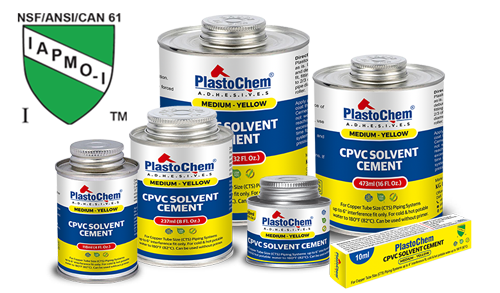1. What is CPVC Solvent Cement?
CPVC Solvent Cement is a specially formulated adhesive used to join CPVC (Chlorinated Polyvinyl Chloride) pipes and fittings. It creates a strong, leak-proof bond by chemically fusing the pipe and fitting surfaces.
2. What are the key features of KG Plastochem CPVC Solvent Cement?
- High bonding strength
- Leak-proof and durable joints
- Fast setting and easy application
- Resistant to high temperatures and pressure
- Suitable for both hot and cold water systems
3. How do I use CPVC Solvent Cement?
- Cut the CPVC pipe squarely and clean it.
- Apply CPVC primer (if required) to the pipe and fitting.
- Apply a uniform layer of CPVC solvent cement on both surfaces.
- Join the pipe and fitting immediately with a twisting motion.
- Hold for a few seconds to set and allow curing time before pressure testing.
4. What is the curing time for CPVC Solvent Cement?
Curing time varies based on temperature and pipe size. Typically:
- 1-2 hours for small pipes (½” to 1”)
- 2-4 hours for medium pipes (1 ½” to 2”)
- 6-24 hours for larger pipes (above 2”) or low temperatures
5. Can CPVC Solvent Cement be used for PVC pipes?
No, CPVC solvent cement is specifically designed for CPVC pipes. For PVC pipes, use PVC solvent cement.
6. Is a primer required before applying CPVC solvent cement?
A CPVC primer is recommended for better bonding, especially for high-pressure applications, but not always mandatory.
7. What temperature range can CPVC Solvent Cement withstand?
CPVC solvent cement can handle temperatures up to 93°C (200°F), making it ideal for hot water systems.
8. How long does CPVC Solvent Cement last?
Unopened cans have a shelf life of 2-3 years when stored properly in a cool, dry place. Once opened, use it within one year for best results.
9. Is CPVC Solvent Cement safe for potable water?
Yes, KG Plastochem CPVC Solvent Cement is certified for potable water applications and meets industry safety standards.
10. Where can I buy KG Plastochem CPVC Solvent Cement?
You can purchase our CPVC solvent cement from authorized distributors, hardware stores, and online marketplaces. Contact us for bulk orders or dealership inquiries.
11. Can CPVC Solvent Cement be used for underground piping?
Yes, CPVC solvent cement is suitable for underground installations, but proper curing time should be allowed before burying the pipes to ensure a strong bond.
12. What should I do if CPVC solvent cement thickens over time?
If the solvent cement thickens, it may be due to improper storage or exposure to air. Do not attempt to dilute it with any chemicals. It is best to use fresh solvent cement for reliable bonding.
13. What is the difference between regular, medium, and heavy-bodied CPVC solvent cement?
- Regular-bodied: Suitable for smaller pipe sizes (½” to 1”) and low-pressure applications.
- Medium-bodied: Ideal for pipe sizes up to 2”, providing a stronger bond for residential and commercial use.
- Heavy-bodied: Used for larger pipes (above 2”) and industrial applications requiring extra strength.
14. Can CPVC Solvent Cement be used in wet conditions?
No, CPVC solvent cement should be applied on dry surfaces for optimal bonding. Moisture can weaken the joint strength.
15. Is CPVC Solvent Cement flammable?
Yes, it contains volatile solvents that are flammable. Keep away from open flames and store in a well-ventilated area.
16. How can I remove excess CPVC solvent cement?
Wipe off excess cement immediately with a clean, dry cloth. Once dried, it becomes difficult to remove.
17. Can CPVC Solvent Cement be used for gas pipes?
No, CPVC solvent cement is specifically designed for water supply systems and should not be used for gas piping.
18. What happens if I apply too much CPVC solvent cement?
Excess solvent cement can create a weak joint by preventing proper fusion of the pipe and fitting. Apply a thin, even layer for the best results.
19. Does CPVC Solvent Cement expire?
Yes, it has a shelf life of 2-3 years when stored properly. Discard if it becomes too thick or separated.
20. How do I store CPVC Solvent Cement properly?
Store it in a cool, dry place away from direct sunlight and heat sources. Always keep the lid tightly closed to prevent evaporation.

Comments on “FAQs – CPVC Solvent Cement by KG Plastochem”